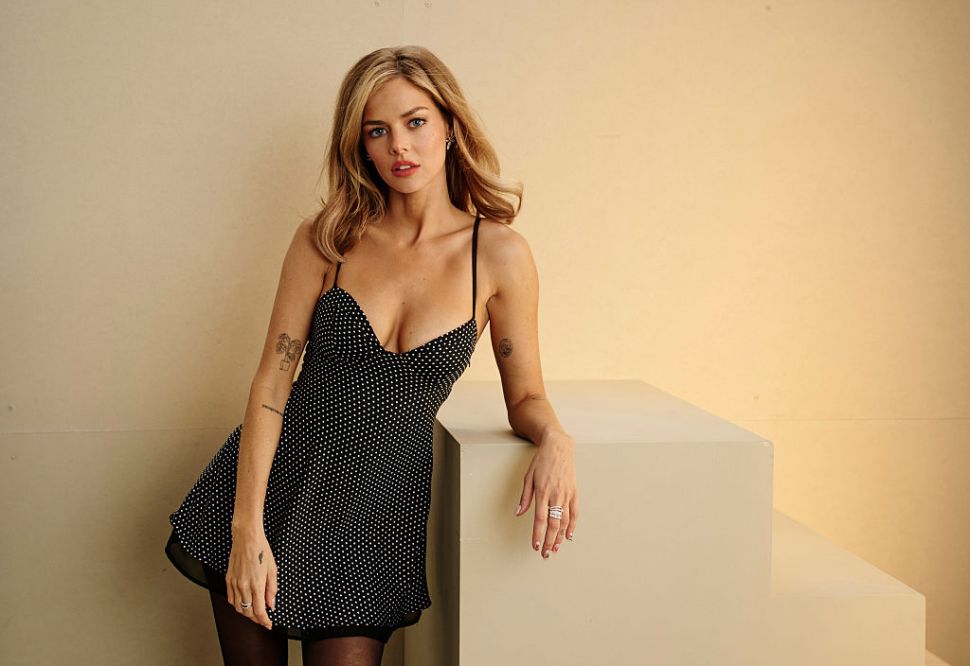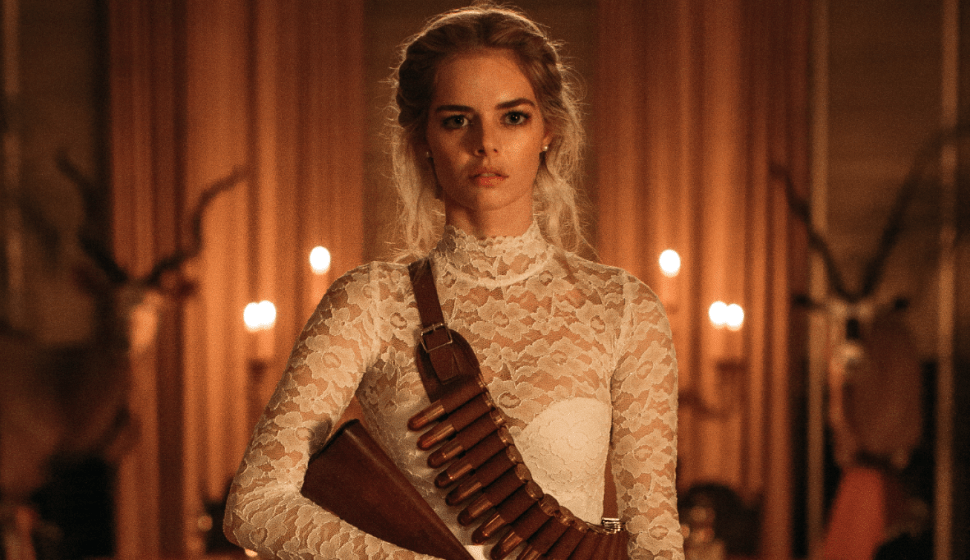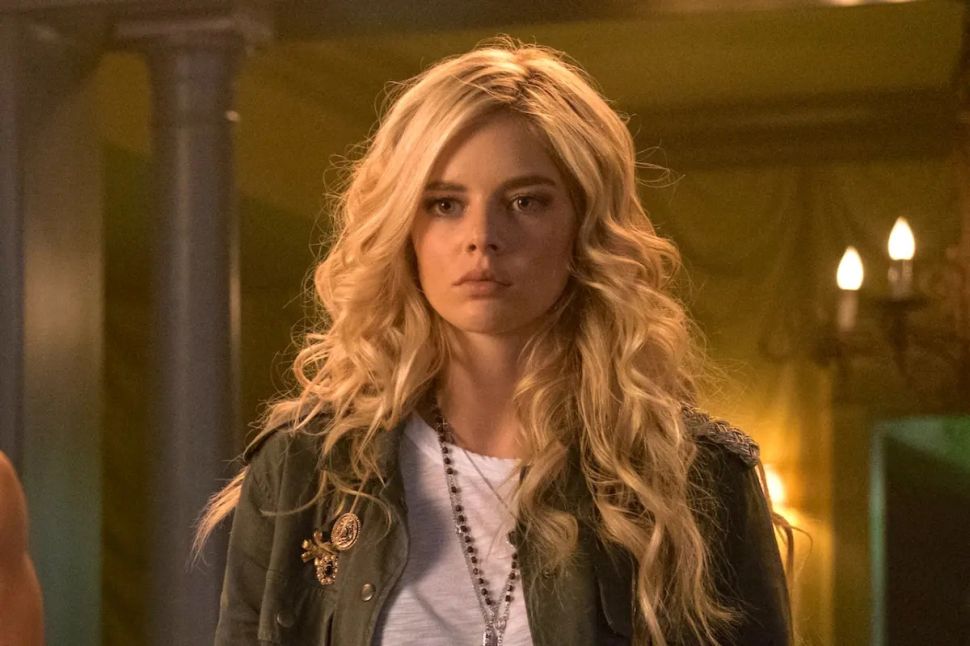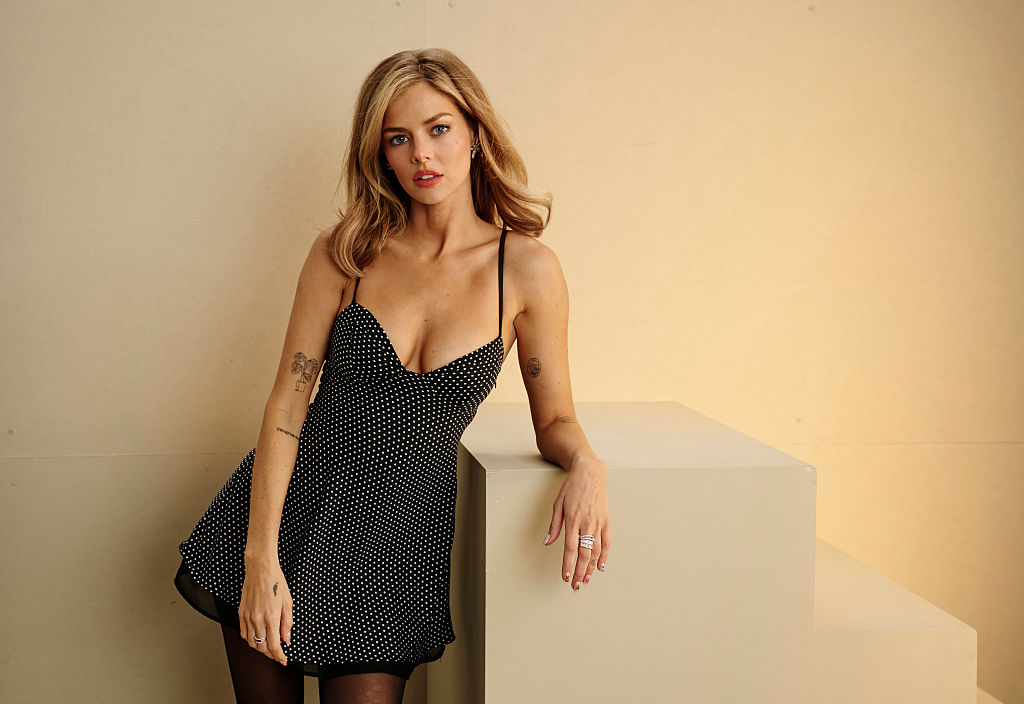 Weaving’s rapid rise is a testament to what can happen when you don’t scorn a genre that’s proven itself to be an ambitious acting vehicle. Photo by Gareth Cattermole/Getty Images for IMDb
Weaving’s rapid rise is a testament to what can happen when you don’t scorn a genre that’s proven itself to be an ambitious acting vehicle. Photo by Gareth Cattermole/Getty Images for IMDb
Samara Weaving doesn’t like to be covered in blood. Yet she frequents the horror genre, digging deep wells of raw human emotion anytime she gets the chance. “It’s such a good vehicle to explore so many things,” she says. In conversation with The Den of Geek during a promo stop for her 2024 film, Azrael, she breaks down some of the film’s central themes. “For this, it’s what is family and what is betrayal and what is superstition. I think using genre as an avenue, you can explore those things, but on an insane level.”
That insanity fuels her to select projects that engage the audience to think and to confront parts of themselves. A film is a reflective mirror that can only tell the truth. And horror movies interact with viewers on a visceral, outrageously personal level. Weaving’s early horror film, Mayhem, for example, comments on office politics, integrity and the desperation to get what you think you deserve. Additionally, The Babysitter speaks to deception, lies and loyalty—all wrapped up in a satanic cult package. These 2017 films put Weaving on everyone’s radar, demonstrating her power as a performer, owed also to her signature primal scream. You know it when you hear it.
The stars perfectly aligned that year, setting the stage for an impressive horror career. In 2017, she also starred in Three Billboards Outside Ebbing, Missouri, a stirring depiction of revenge. Her early choices in projects led to several more strategic horror roles that have propelled her further into the spotlight. Soon enough, everyone in the genre wanted to work with her, and she has since amassed many career-defining outings.
 Weaving in Ready or Not. Courtesy Fox Searchlight Pictures
Weaving in Ready or Not. Courtesy Fox Searchlight Pictures
Her turn as Grace in the survivalist horror film Ready or Not cemented her place as one of horror’s brightest talents. In the last two years, the bold 2019 release has found new life as YouTubers and TikTokers have flocked to the film and shared their first-time-watching reactions. A lucrative business model, reaction channels serve as a subset of YouTube culture, with countless creators making it their full-time job. Samara Weaving’s star exploded right before our eyes and broke down barriers for her work. Such popularity is no doubt a reason we’re getting Ready or Not: Here I Come in 2026. Online buzz in her back pocket proved she has a remarkable box office draw.
She continued leveraging the genre to climb even higher on the proverbial ladder. The aforementioned genre roles earned Weaving appearances in Bill & Ted Face the Music, Snake Eyes, The Valet, Chevalier and Babylon. She also used her horror roles as fuel to land herself a place in Ryan Murphy’s miniseries Hollywood in 2020. While she was flexing her wings, she still had one foot in horror—evidenced by roles in The Babysitter sequel, Scream VI and Azrael, in addition to horror-adjacent thrillers like Borderline, alongside Jack Nicholson’s son Ray, and Last Moment of Clarity. Weaving could do anything if she so desired. Future movie roles include spots in Eanie Meanie, Over Your Dead Body and Carolina Caroline, co-starring horror veteran Kyle Gallner.
Weaving’s embrace of the genre follows a very long tradition of A-list celebrities who have likewise called horror home. Jamie Lee Curtis as Laurie Strode in John Carpenter’s Halloween is a prime example. The daughter of Hollywood royals Janet Leigh and Tony Curtis, she used the blockbuster indie film (it grossed $47 million in the U.S.) as a jumping pad into Hollywood fame. In the decade that followed, she appeared in films such as A Fish Called Wanda and Trading Places, among many others. Her career continued to blossom in the ’90s, when she took on roles in My Girl and True Lies, thus cementing her place as one of the greats.
And Curtis isn’t the only one who started in gruesome horror pictures before branching out. There’s Kevin Bacon in Friday the 13th, Josh Hartnett in Halloween H20 and The Faculty, Jennifer Aniston in Leprechaun, Tom Hanks in He Knows You’re Alone, Brad Pitt in Cutting Class, George Clooney in Grizzly II: Revenge, Return to Horror High and Return of the Killer Tomatoes, Johnny Depp in A Nightmare on Elm Street, Julia Louis-Dreyfus in Troll, Demi Moore in Parasite and Jason Alexander in The Burning. These roles provided them with opportunities to exercise their acting muscles through diving into major themes, such as generational trauma and revenge, and demonstrate their diverse talents. In leveraging these acting stints, they could then enjoy basking in the spotlight.
More recently, Neve Campbell used her newfound TV fame in Party of Five for her first widely released film, the witchy The Craft, which caught the attention of famed horror director Wes Craven, who cast her in 1996’s Scream. She subsequently returned to the franchise for Scream 2, Scream 3, Scream 4 and Scream 5—she’s also expected to appear in Scream 7, coming in 2026. Her commitment to the franchise solidified her as a bonafide Scream Queen.
Many other names kick-started in modern horror. Those include Matthew McConaughey (My Boyfriend’s Back), Chloë Grace Moretz (The Amityville Horror), Leonardo DiCaprio (Critters 3), Amy Adams (Psycho Beach Party), Hilary Swank (1992’s Buffy the Vampire Slayer), Sarah Michelle Gellar (1997’s I Know What You Did Last Summer) and Jessica Alba (Idle Hands).
For a genre so popular in drawing A-list talent, awards industry players have rarely given the genre its due when it comes to major hardware. Only eight horror films have been nominated for Best Picture at the Oscars—those are: Gaslight (1944), The Exorcist, Jaws, The Silence of the Lambs, The Sixth Sense, Black Swan, Get Out and The Substance. Typically, horror is relegated to technical awards in terms of winning. For example, The Fly took home the trophy for Best Makeup and Hairstyling in 1987. Despite being critical darlings, including Hereditary, which failed to generate a nomination for Toni Collette, horror, by and large, has been ignored since the genre began over 100 years ago.
Judging by horror’s track record at the Academy Awards, voters often see the genre as low-brow, largely a holdover perspective from the slasher boom of the 1980s. During the decade, slashers became the most sought-after subgenre, owing to the success of 1978’s Halloween and 1980’s Friday the 13th. Everyone wanted to make a slasher. It’s the cheapest to make, with often big returns at the box office.
 A still from The Babysitter. Courtesy Netflix
A still from The Babysitter. Courtesy Netflix
The genre has been marked by two slasher “renaissances.” First, 1996’s Scream rekindled the public’s appetite for blood, guts and gore, leading to such other teen-horror focused entries like I Know What You Did Last Summer and Halloween H20. But by the turn of the millennium, slashers fell out of favor for the “torture porn” era, which lasted for the better part of a decade. The second wave of slashers arguably began in 2015 with the likes of The Final Girls and Most Likely to Die. In the next 10 years, films such as Freaky, Happy Death Day, Ti West’s X and the Fear Street trilogy failed to generate enough critical acclaim to result in Oscar nominations. And that’s not for lack of trying. The genre, it seems, was and is still painted with a broad enough brush to convince voters that all the films are the same. There are rare exceptions, of course, but blockbuster box office numbers so infrequently match industry recognition.
Then, there’s the matter of “elevated horror,” such as The Babadook, It Follows and Hereditary. The term, an erroneous qualifier, masks someone’s personal taste in horror, making it seem that all other varieties lack artistic merit. In recent years, the lack of considerable credibility given to Pearl, Longlegs and Strange Darling, all of which contain Oscar-worthy lead performances, for example, resulted in nary an Oscar nomination among them. Perhaps it’s the heavy use of blood and violence that has deterred voters from backing these films, and thus, overlooking some stellar acting work.
For her part, Samara Weaving has suffered because of this long-standing trend for her work in Ready or Not and Azrael, career bests that best capture her range. Actively pursuing industry awards should never be the endgame of art; instead, the art should speak for itself. It’s a futile effort and only leads to disappointment. Despite the lack of Oscars or other nominations, Weaving remains committed to the genre that birthed her career.
“There’s a difference between success and fame. I think if you’re trying to be famous, then that’s tricky because fame is fickle, but if you’re trying to be successful, that’s a good thing,” Weaving told Wonderland in a cover story. “I just love what I do, and if I can keep working, then I’ll be happy, but I think if I was searching for fame? That would not end well…”
Horror remains as both a genre worth playing around in and a conduit for success elsewhere in Hollywood. Samara Weaving is a testament to what happens when you embrace where you came from and what can happen when you don’t scorn a genre that’s proven itself to be an ambitious acting vehicle. Don’t bite the hand that feeds you, as they say.
Plus, the genre continues to be a breeding ground to nurture new talent. This summer has brought us Miles Caton, who made major moves in his first movie role as Sammie in Ryan Coogler’s Sinners. It remains to be seen if this turn will bring a flood of offers, but it’s safe to say he’s got our attention. Likewise, box office juggernaut Weapons featured Cary Christopher in the biggest role of his career so far. Horror will always be a rite of passage, so to speak, and a way to put your name in the minds of as many people as possible. Today’s breakthrough horror stars are tomorrow’s acclaimed A-listers.
More in Film

